| Marvon Willson takes the office on Jan. 9 at the Wellington City Council meeting. Glen Wells and Paula Noyes were also re-elected to the council and sworn in at last Wednesday’s meeting. |
About 30 Wellington residents filled the city council chambers last Wednesday to hear discussion on a zone change for an east Main Street property and a proposal for new all-terrain vehicle ordinance.
The Jan. 9 meeting opened with a public hearing on rezoning 2249 East Main Street from residential to highway commercial.
Discussion of the property which sits about 240 feet north of U.S. Highway 6 sparked questions and concerns from residents.
One property owner asked if his land, which is adjacent to 2249 East Main, would also end up being rezoned commercial as a result of the proposed action.
Another resident objected to what he said he believed the owner of 2249 wanted to put on the property if it were to become commercial.
“I am opposed to the type of business he wants to put in what I would call a junkyard,” said the resident.
Mayor Karl Houskeeper reminded the crowd that the discussion was about rezoning only and the city had not received a business license request for the piece of property.
“This is just a zoning change,” said Houskeeper .
Richard Stephenson, the owner of 2249 East Main, told the audience and the council that he thought the rezoning of his was actually in line with the city’s master plan for the area.
“It was my understanding that the city has put some effort into making the area commercial,” said Stephenson. “I do believe this would a positive for the city.”
Houskeeper confirmed that it would probably make sense commercialize the area where the property is located.
“If we are going to do this, we should take the whole strip,” said the mayor.
Wednesday’s hearing was for discussion only. The city council will make a motion regarding the property at a later meeting.
Following the public hearing, a group of ATV enthusiasts took the floor to lobby the council to establish an inclusive and official ordinance which would allow the vehicles in designated roadways.
Resident Rory Bradley led off the discussion, presenting the council with copies of existing ordinances from Helper and East Carbon.
“If you would look at Helper’s ordinance, it explains a lot of the stuff we would like to have,” explained Bradley.
Several councilmembers indicated that they thought the city already had some type of ordinance.
“I thought we were looking at the gas line corridor,” said Councilmember Glen Wells. “But why don’t you put together a proposal as to which roads would work? I don’t think you would have much opposition to it.”
Councilmember Ed Chavez added that the proposal should also include a suggested speed limit.
Houskeeper confirmed that discussions had been ongoing about clearing the way for ATVs.
“We talked about putting the trail head and restrooms behind 900 East,” said the mayor.
Wellington Police Chief Lee Barry reminded the mayor and city councilmembers about potential liabilities from giving the nod to ATV use.
“We would have some liability issues to resolve,” noted the police chief. “And then we have the railroads claiming that the ATVs are ruining their tracks. We can’t incorporate the rail lines or those guys would have a fit.”
Barry told the Wellington officials and the group of local residents in attendance at the council meeting that the best public entities to emulate in policy would be Salina or Richfield as the two cities had addressed the potential liability.
Resident Debbie Bradley questioned the liability issue.
“Why would it be any more than cars?” asked Debbie Bradley.
The police chief pointed out that the State of Utah requires vehicles that are operated on the roads to be licensed and have insurance coverage.
Liability notwithstanding, Debbie Bradley reminded the council how important the off-road vehicles are to some of Wellington’s residents.
“A lot of our older citizens are riding ATVs,” said Debbie Bradley.
After Chavez declared that the ordinance was something that the city needed to move on, his colleagues serving on the city council added a couple more caveats.
Councilmember Paula Noyes reminded the Wellington officials that the city’s existing ordinance addressed issues of safety.
Councilmember Marvon Willson said Moab had to close a lot of the city’s trails that ran across the highway because of heavy traffic.
At the end of the meeting, the Wellington police chief added some additional concerns.
“The only part of the whole mess (ATV ordinance) that scares me is some 16-year-old who won’t care about safety,” indicated Barry.
If the ordinance is passed, the police chief said Wellington city needs to be proactive and make certain that emergency response teams can get to the trails.
“We need to find vehicles so that we can get there,” explained Barry. “There are going to be crashes and we know that.”
The Wellington council meets the second and fourth Wednesdays of month at 7 p.m.

